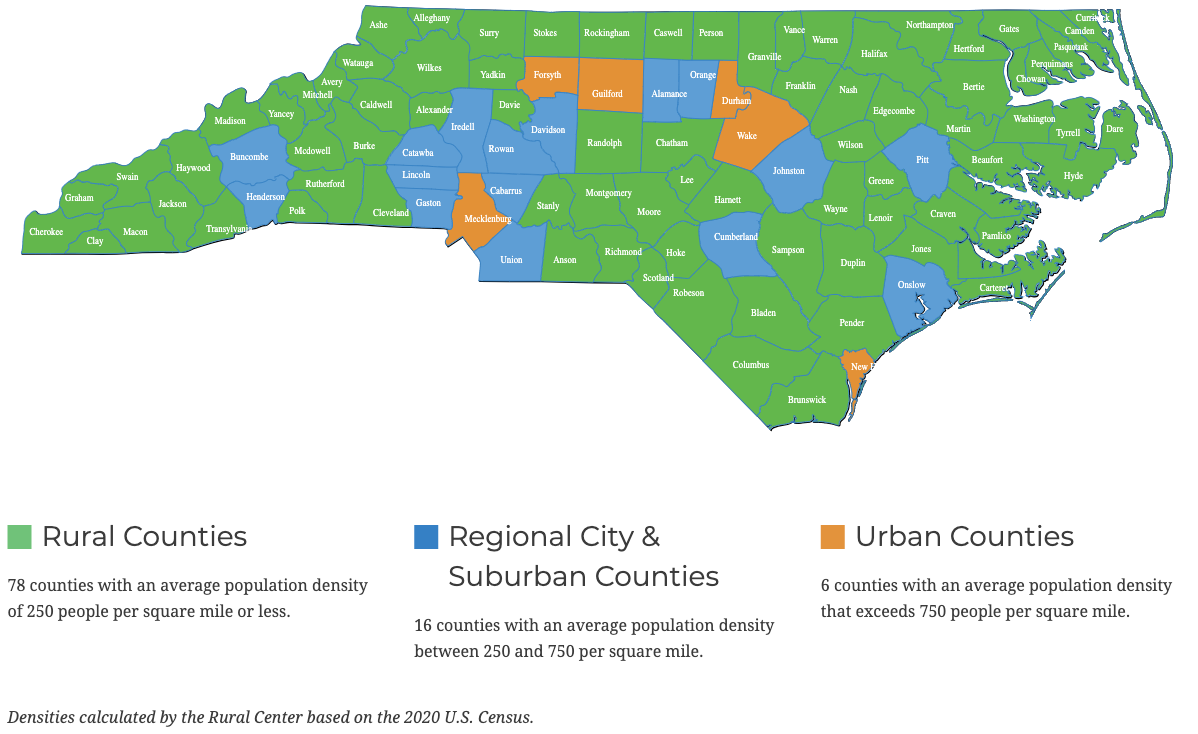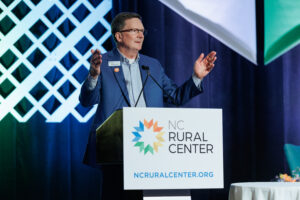Supporting family and community and the power of small business were all central themes as Patrick Woodie (’87, JD ’90) grew up in tiny Piney Creek, North Carolina, in the northwest corner of rural Alleghany County, about 90 minutes from Winston-Salem.
At his maternal grandmother’s country store, Woodie sometimes ran the cash register and pumped gas, reveling in the tall tales customers would share. His father, a high school business teacher, was often helping his students secure after-school jobs or gearing up for an annual field trip, which Woodie sometimes joined, to take inventory for a local pharmacist.

Patrick Woodie, president and CEO of the NC Rural Center. Photos courtesy of the NC Rural Center
And everybody was always pitching in to help with something, including a community-wide effort to turn an abandoned school building into Piney Creek’s first volunteer fire department.
“It really had a profound effect on me,” Woodie says of growing up in that rural community. “You knew your neighbors. You visited your neighbors. Everybody helped each other.”
Those experiences were foundational for Woodie as he’s built a career supporting rural communities in Alleghany County and beyond. Today, Woodie is president and CEO of the NC Rural Center, a Raleigh-based nonprofit that brings awareness and resources to rural communities across the state.
Woodie’s success as a statewide leader highlighting the state’s rural needs ties directly back to his early days in Piney Creek and, later, working in economic and community development in Alleghany County, says Maggie Sauer, a longtime colleague and director of the Office of Rural Health, part of the North Carolina Department of Health and Human Services.
“Because he’s done the work in the community, people trust his voice at these other levels,” Sauer says. “That authenticity and trust is something you can’t find in everybody.”
Always stepping up
By the time Woodie arrived at Wake Forest, he already had some knowledge about the importance of economic and community development in rural communities through his life experiences. College provided time to finetune his career ambitions.
Active in political campaigns, even as a child, Woodie built on that interest at Wake Forest, majoring in politics. He particularly enjoyed classes with Professor of Political Science Jack D. Fleer, who was his faculty adviser and longtime department chair. Woodie also was active in politics on campus as part of a small group of College Democrats. “I can just remember walking around the Quad, and for every Mondale-Ferraro sign that was in the window, there were 20 Reagan-Bush signs,” he says with a laugh.
Law school seemed like a logical step, though he’s never practiced. “It was a wonderful education,” he says. “It teaches you how to think. It teaches you how to write. Everything that I learned in law school has served me well in my profession.”
After graduation, Woodie worked for U.S. Rep. Stephen Neal (LL.D. ’91), a Democrat, before returning home to serve as the first executive director of the Alleghany County Chamber of Commerce and the county’s lead economic developer from 1992 to 1999.

Patrick Woodie on the job
During that period, Woodie was working to recruit industrial businesses to the county and also on a collaborative effort that resulted in President Bill Clinton’s naming the New River, North America’s oldest river, which runs through the county, one of 14 American Heritage Rivers.
But no job was too small. When one of the chamber’s board members mentioned that she needed help washing dishes at the pizzeria she owned because her husband, who worked in the kitchen, was sick, Woodie donned an apron and stepped up to the sink.
That pizza shop owner is the mother of another Alleghany County native and statewide leader, Jeff Cox, the current president of the North Carolina Community College System. Cox and Woodie reminisced about that day — and a picture that Cox’s mother captured of the moment — after Cox was appointed to his role in 2023.
“Even though he is executive director of the chamber of commerce, he thought, ‘Well, why not me? I’ll jump in to help wash dishes,’” Cox says. “That’s just who he is. He’s humble, smart as a whip, and just willing to roll up his sleeves and do what it takes to support the folks he’s working with.”
It took Woodie’s rural center predecessor three tries before Woodie agreed to leave Alleghany County in 2006 to move to Raleigh and join the center, first as vice president of rural development programs.

Most North Carolina counties are still considered rural, though they are growing.
By then, he’d also served a term on the Alleghany County Board of Commissioners and was leading countywide economic development and revitalization efforts. His work included renovating the abandoned textile plant where his mother had worked for 42 years in the office and turning it into the Alleghany campus of Wilkes Community College.
The move to Raleigh came at a difficult time. Woodie’s father had died, and his mother was still living at the family’s homeplace. “Leaving my mom was just the hardest thing I ever did,” Woodie says. “But nobody encouraged me more than she did.”
Pivotal moment for rural communities
This year, Woodie is marking a decade as the NC Rural Center’s president. The group’s mission is to develop, promote and implement sound economic strategies that bolster the quality of life for rural North Carolinians.
It’s a pivotal moment for rural communities, particularly because of rural demographic changes and federal funding opportunities sparked by the pandemic, he says. In 2023, North Carolina’s population was 10.8 million. A center study showed that from 2020 to 2023, the population in North Carolina’s 78 rural communities increased by 98,372 people, a 2.7% rise. That’s nearly the same population growth rate as the previous decade when 106,632 people, a 2.9% increase, moved to the state’s rural counties.
In other words, net migration into rural counties started growing in the late 2010s, the study says. But it grew even faster after the pandemic and is still rising, largely because of the growth of remote work.
“All of that is really encouraging, but it comes at a time when everything is changing,” Woodie says. “The pace of change, because of technology, has accelerated greatly.”
His work focuses on providing rural communities with what they need to thrive in this fast-paced world. High-speed, affordable broadband access, for example, is critical for the future of rural economies, making it easier for people to start businesses, get an education and access telehealth services, Woodie says. But across the state, particularly in northeastern and western counties, broadband can be difficult to come by. Residents are grappling with slow speeds to no access at all.
Through its Collaborative Broadband project, the center is working with local leaders in the least connected parts of the state to help them better understand federal and state funding options and work with internet service providers. As part of the project, consultants with the center provide support to local officials to navigate complicated funding requirements. They also are highlighting unique obstacles that can make broadband access more complicated in rural areas — from swamp lands to agricultural areas where aerial lines can conflict with farm machinery.

Woodie spends much of his time on the road.
Another focus for Woodie is supporting small businesses. In the last five years, the center’s small business lending arm made more than 1,600 loans totaling more than $84 million. So is aligning education levels with job opportunities, particularly to resolve severe shortages of healthcare professionals across the state.

Woodie speaking at the NC Rural Summit
As he thinks about these challenges and others, Woodie prescribes a holistic approach that features four building blocks of economic development, which he learned while attending the center’s Rural Economic Development Institute years ago.
Those four pieces include ensuring communities have adequate physical infrastructure, such as roads and broadband, and productive civic and social leadership, including government, faith communities and nonprofits. Workforce development, including education at all levels, and an atmosphere where businesses want to invest and create more jobs, round them out. “It’s all interconnected,” Woodie says. “Everything is economic development.”
This fall, as the center develops a 2025 policy agenda to present to state and federal lawmakers, Woodie has taken to the road in his usual fashion to meet with local leaders and business owners and learn about their challenges and needs. Most years, he puts about 30,000 miles on his car, crisscrossing the state.
“You can’t represent rural North Carolina if you don’t spend time there,” Woodie says. But it’s also the part of the job that he enjoys the most.
“I can’t imagine a better (career) for me that lets me really do the work that I understand and that I can help advance, and that can really have an impact on the lives of people that grew up in communities like I grew up in,” he says. “That’s really rewarding.”
Sarah Lindenfeld Hall is a longtime North Carolina-based journalist, former staff writer for the Winston-Salem Journal and The (Raleigh) News & Observer and founding editor of WRAL-TV’s popular parenting website. Today, she’s a freelance writer, regularly diving into stories about interesting people and parenting, health, education, business and technology topics.


